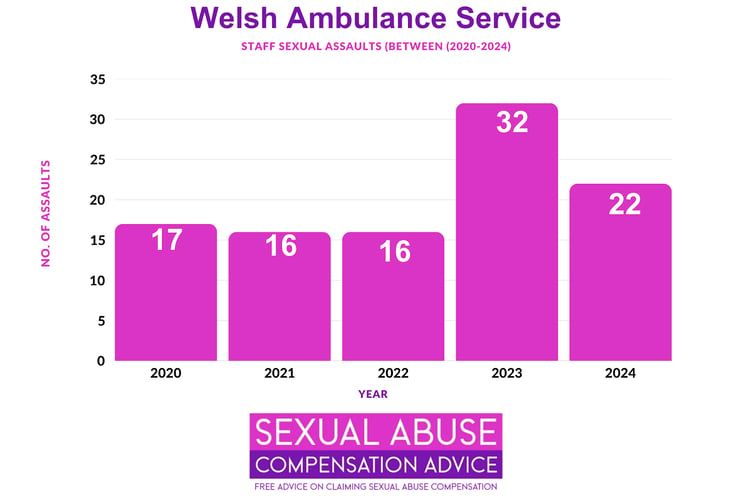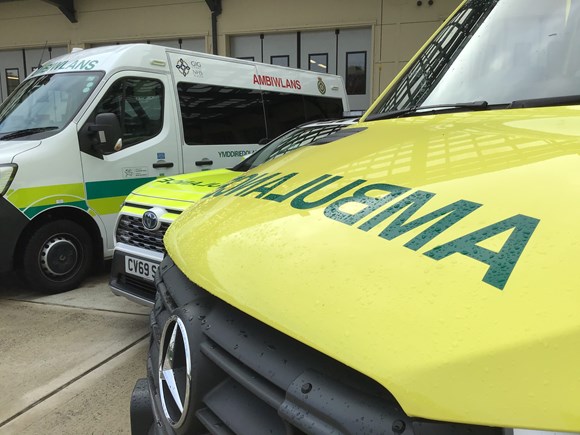“It’s an utter disgrace” says NHS union as more than 100 Welsh Ambulance Service staff and paramedics have been sexually assaulted while on duty in the last five years.
Incidents have included patients behaving sexually inappropriate towards staff members, patients exposing themselves and incidents of groping
New figures obtained by Sexual Abuse Compensation Advice (SACA) through Freedom of Information request reveals that between 2020 and 2024, more than 100 WAS staff were subjected to various forms of sexual assaults while at work, with incidents esalating over the last five years.
Since 2020, there has been 103 instances of sexual acts, behaviours conducted towards staff by patients or members of the public including, sexual harrassment, sexual misconduct, sexual assault and rape.
National Officer for GMB, the union for NHS Works, Rachel Harrison told SACA: “It’s an utter disgrace our ambulance workers suffer these attacks as they try to save lives.
“This is a national problem and it is getting worse.”
Between 2020-2024:
- 2020 saw 17 sexual assaults on staff. Of those, 2 were patient to staff indecent exposure, 14 were sexual harassment/assault - patient to staff and 1 was sexual harassment/assault by a relative/escorty/member of the public to staff.
- 2021 saw 16 assaults in total. Of those, 2 were indecent exposure and 14 were sexual harassment/assault.
- 2022 recorded 16 assaults.
- 2023 figures rose to 32 sexual assaults by patients or members of the public.
- 2024 saw 22 sexual assaults including, indecent exposure, sexually inappropriate behaviour, sexual assault and verbal assault (gender/sexual orientation).

The revelations come amid growing national concerns over violence and abuse against healthcare workers, with calls for stronger protections and zero-tolerance policies across all NHS services.
More than 65,000 NHS staff reported sexual assaults and harassment for patients, their relatives and other members of the public in 2024 in the health service’s annual survey.
Union officer, Ms Harrison added: “GMB members were instrumental in changing the law, to make attacks on ambulance workers an aggravating factor when it comes to sentencing.
“But it’s not enough - we need a zero tolerance approach from the police, trusts, Ministers and the public.”
Sexual Abuse Compensation Advice also obtained the latest data from NHS Resolution, the legal arm of the NHS, regarding the number of legal claims that have been lodged against UK Ambulance Trusts as a result of assaults (of all types) on staff.
Since 2019, there have been 74 legal claims and incidents of ambulance staff assaults reported to the NHS legal body. Of those, 36 related to orthopaedic injuries, 13 pertained to facial injuries and 9 were for head injuries.
A further 8 claims and incidents were logged relating to psychiatric damage and eight more for injuries to internal organs.
In the last five years, UK Ambulance Trusts have settled 15 such claims with compensation payouts amounting to £589,533.
A further £100,498 was paid for NHS legal costs as well as £267,518 for the claimant’s legal costs - giving a grand total of £957,549.
Figures from the Criminal Injuries Compensation Authority (CICA) - which is a government-backed organisation that can offer compensation to victims of sexual abuse, shows that just 13,313 applications were received in the last year from alleged victims of sexual assault or abuse.
CICA Specialist at SACA, Ellie Lamey said: “The number of sexual assault/abuse victims who have applied for CIC is staggeringly low compared to the number of offences being reported.
“It is so important that victims know there is support available for them and not to be deterred or fearful of rejection.
“Victims should be aware that they can report historical periods of abuse/assaults to the police, regardless of the amount of time that has passed.
“Victims can avoid rejections by ensuring they fully cooperate with the police in bringing the assailant to justice as well as seeking appropriate medical attention regarding any physical or psychological injuries sustained from the assault they are a victim of.
“CICA data from 2020-2022 shows that 18 per cent of applications are submitted outside of the two-year time limit, and of these 61 per cent went on to receive an award.
“With relevant evidence, we can provide exceptional circumstances that have contributed to the delay in a victim submitting an application.”
Sexual Abuse Compensation Advice (SACA) offers a specialist service for anyone looking for support and advice after being affected by rape or sexual assault.
They operate a 24-hour helpline and live chat service which you can access on their website.





Comments
This article has no comments yet. Be the first to leave a comment.